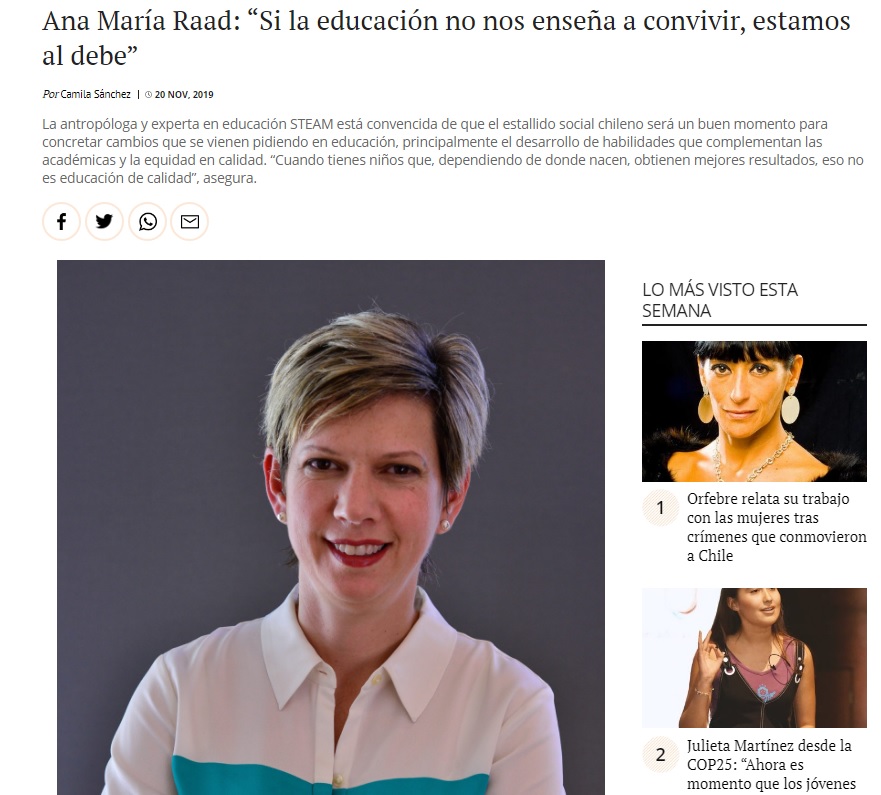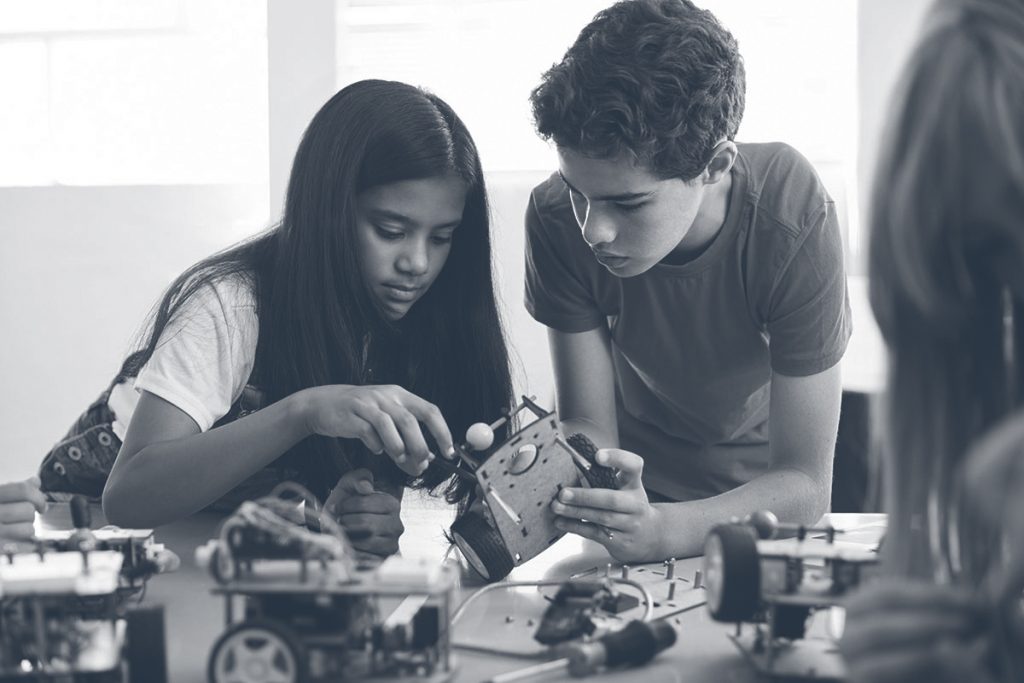“What STEAM education seeks is to integrate knowledge and put it into practice, solving problems, learining by doing. It is not only an answer to how classes are made“.
The anthropologist and expert in STEAM education s convinced that the Chilean social outbreak will be a good time to make changes that are being requested in education, specially the development of skills that complement academics and equity in quality. “When you have children who, depending on where they are born, get better results, that is not quality education,” he says.
For years, education has been an issue that brings thousands of Chileans to the streets – both schoolchildren and university students – who protest for a more equitable and quality system. Thus, the current social outbreak that was generated in the country is a new opportunity to generate changes.
This is what the Ecuadorian anthropologist Ana María Raad believes, who has lived in Chile for 20 years, who has been leading innovative social, educational and development impact programs with the use of technologies, both for governments and public organizations, as well as companies and private entities .
“The social outbreak once again puts the focus on the importance that, although academic matters are very important, if education does not teach us to live and live together, we are well owed,” says the director of the EcosiSTEAM program.
What windows of opportunities open with this social outbreak?
It is definitely an opportunity to accelerate some changes that we had been anticipating and moving in education, such as focusing on the development of skills that complement the academic ones. That means: working on citizenship issues, knowing how to collaborate, being able to share with the other. We have been realizing that memorizing is insufficient and the ability to develop a deep and critical thinking has been pending for some time. Today, what is on the table is precisely those attitudes that give account, on the one hand, of a youth that requires a more complementary vision of things and, on the other hand, of learning to live together.
Should that education start as children?
Absolutely. We expect that from the kindergarten, where the relationship is essential. In the school world, citizenship education and an integral look are needed, but the system has focused more on standardized tests.
Education has always been one of the main themes of protest. What measures should the government take?
Mainly, make a reflection on why there is so much sense of lack in education. In Latin America and Chile we have talked a lot about the issue of quality, but that is more than good results. A quality education without equity is not quality. A quality education without it being relevant, either. When you have children who, depending on where they are born, get better results, that is not quality education. I think it is very important to listen to young people today, they are not asking for anything new, basically knowledge, skills that they can apply in daily life and that allow them to integrate into the work and social world, where technology, science, appears a lot. the need to have the capacity to innovate.
Ana María is director of the EcosiSTEAM program, an initiative that was formed with the Harvard University regional office and with support from the US embassy, which seeks to bring evidence that the STEAM system (which promotes the learning of science, technology , mathematics, engineering and art) is effective in improving students’ learning, environment, abilities and skills.
What is STEAM education?
What STEAM education seeks is to integrate knowledge and put it into practice, solving problems, prototyping and developing challenges of daily life such as global warming and personalities on the Internet. Not only is it an answer to how classes are done – which helps teachers to put more confidence in students – but behind them there is a much more active look at education, which gives children more autonomy and allows them Take a problem of daily life and investigate it, systematize it with the contents and find a solution.
What is the current situation of Chile in this type of education?
In terms of the STEAM approach, both in science and in technology and mathematics, our learning outcomes are not satisfactory, so there is a must for children in general. In addition, there is a giant gap in careers that have to do with these areas: engineering, science, the entire technological field. They are careers that culturally girls do not usually access due to a theme of prejudice, purely cultural. Third, the STEAM field forces us to have a much more active practice and didactics than we have. We are well owed as a country, but also like all crises, they can be great opportunities.
How can innovation be applied in classrooms?
We have seen the desire of teachers to change their practices. It is not easy, it takes time, its schedules are complicated, but I would like to see the light at the end of the tunnel. That requires a job at the level of school principals, to be able to generate spaces so that between teachers of different subjects they can have conversations, exchange of ideas and joint planning. This is not solved by a teacher inside the school, but rather by a community that poses the challenge of developing projects.
Will that be the way to educate yourself in the future?
The education of the future gathers much of the past, but it is much more practical, more connected with daily life and with new knowledge, because we need them. We must make an appropriate combination and there the technological factor can not forget. Here in Chile we still cannot see the dimension of what technology means for the development of education. It can be a very strong inclusion factor, but that does require large investments from the state, private world and philanthropists to invest in these platforms.
Link to the interview: https://mujer.eldinamo.cl/sociedad/2019/11/20/ana-maria-raad-si-la-educacion-no-nos-ensena-a-convivir-estamos-al-debe/


